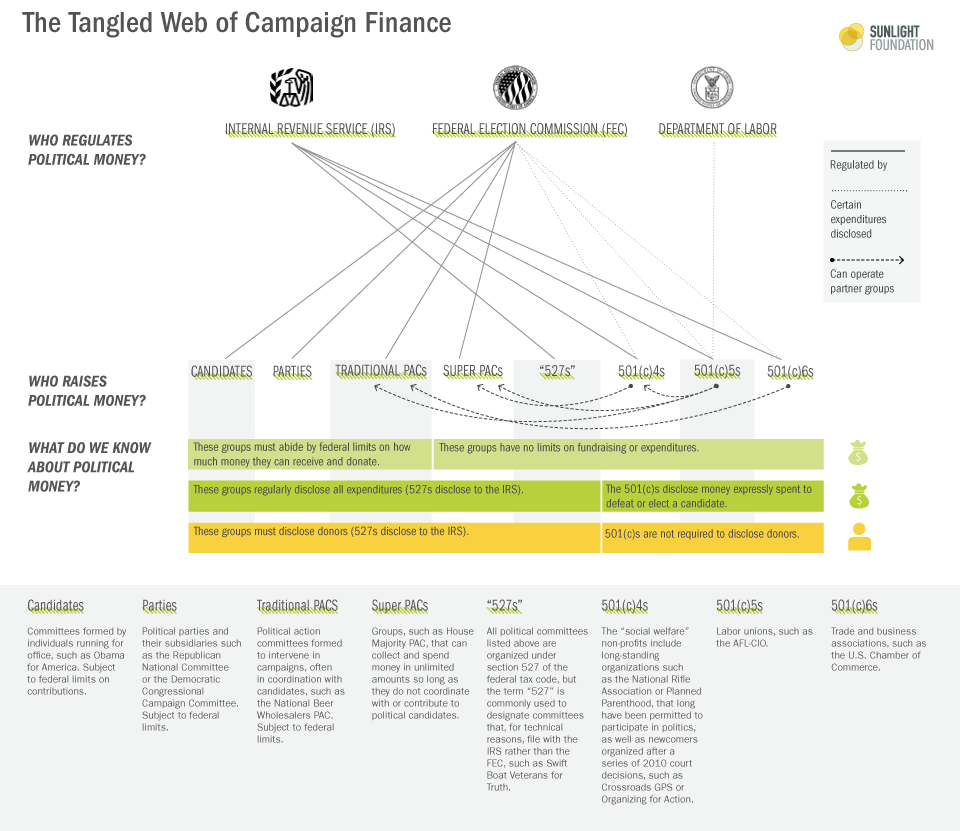A few months back I asked the
question: “Why is it preferable for a campaign to be
self-funded than to be funded by donors? Or as I stated originally
in its undiplomatically variation: Why is
it better to allow a wealthy man to buy an election directly, than
through an intermediary?
Since
then it's been an examination of the Supreme Court's continual
enthusiasm to allow more money in elections. But the most relevant
case to the question at hand was earlier, when the Supreme Court
ruled in Buckley
v. Valeo,
there is no risk of corruption if a candidate spends their own money.
But, while one must admit a candidate can't be corrupted by
themselves, isn't it true that a system can be corrupted by wealth?
In campaign finance, corruption is normally associated with donors
receiving favors for donations. But corruption is any form of
dishonest conduct, involving illegal trading of power and bribery. A
person can be corrupt, and corrupt a system with the money they
possess. A democracy, in which everyone is equal member, is
corrupted by extravagant spending by the few, regardless of whether
its source is a donor or a campaigner. Why should the singular, the
solitary, the rich, be allowed such an advantage? Is it because, as
President Trump said yesterday:
“You
appoint a rich person to be in charge of the economy... because
that's the kind of thinking we want … they don't want the money,
they're running the country … they are brilliant business minds …
and I love all people, rich or poor, but
in those particular positions I don't want a poor person,
does that make sense?”
No,
it doesn't make sense. President Trump implies the
wealthy are abler than the poor, or at the very least, understand
economics better than those in poverty. But these Goldman Sachs
robber barons (who infect and pervade both parties) are only skilled
at enriching themselves and their Wall Street Firms. Current
Director of National Economic Council, Gary Cohn, collected an
incredible sum during his time as Goldman Sachs President, and led
his company through the 2008 crash. Cohn managed to protect
the company by deceiving investors, and then profited off the
12.6 billion Goldman Sachs received in the bailout, squeezed from the
taxpayers who he'd defrauded. He was rewarded in 2008 with
a sixty-seven and a half million salary,
including twenty-six million dollar bonus, and yet for all his
capacity to steal from the middle class while enriching himself and
his friends, his abilities are neither proof he understands economic
theory, nor would one want this methodology to be implimented as
national financial policy.
Trump
implies Gary Cohn, Steven
Mnuchin,
and Wilbur
Ross
are economic geniuses, experts,
when in fact they are not: just men who've acquired egregious wealth
at the expensive of the majority. They hoard wealth like dragons,
and one hopes they suffer the same fate as Lord Octesian.
Wealth
does not furnish someone with the genius for administering a country,
nor an economy, even if the fortune is self-earned, and not the gift
of a benevolent parent. Nor should the ability to accumulate cash,
to focus one's mind on nothing but self-enrichment, imbue any citizen
with more “speech” as the Supreme Court has continued to decide.
And wealth should not allow anyone to fund their own campaign, free
of public support. A campaign, funded by the plutocratic few is as
corrupt as can be, whether it be self-funded or supported by
corporations and wealth friends.
What
are the solutions? Two come readily to mind, though the first is
made nearly impossible because it requires Congress acting against
their interest (unless someday their interest realigns with the
people). A legislative solution: limit the amount citizens can
donate to candidates, to an value which the average American can
afford. The current limit on donations is $2,700 per campaign, an
impossible number for most Americans to even support one campaign
fully. Imagine the Republican
outcry if citizens spent the full amount on supporting
campaigns, rather than on their healthcare. The purpose of a limit:
so each American is of equal value to the political machine, so each
citizen is courted with the same intensity, and so each citizen is
equal to each corporation. One possible value, $200, seems high, but
is the current maximum which a citizen can donate without reporting
to the Federal Election Commission. Yet, $200 is more than the
average American can afford to give, and so another number is
warranted, $29. This is the average amount donated to the Bernie
Sanders campaign during the 2016 primary. $29 is certainly a number
almost anyone can afford, if they desire.
Yet,
even if Congress passed such legislation, the people would then need
contest with the Supreme Court. As demonstrated these past months,
they seem dedicated to unlimited cash in campaigns, and appear blind
to the rampant corruption cash causes in the public mind.
Next week... A second solution.
Next week... A second solution.
The Supreme Court, Money in
Politics, and Originalism

Comments
Post a Comment